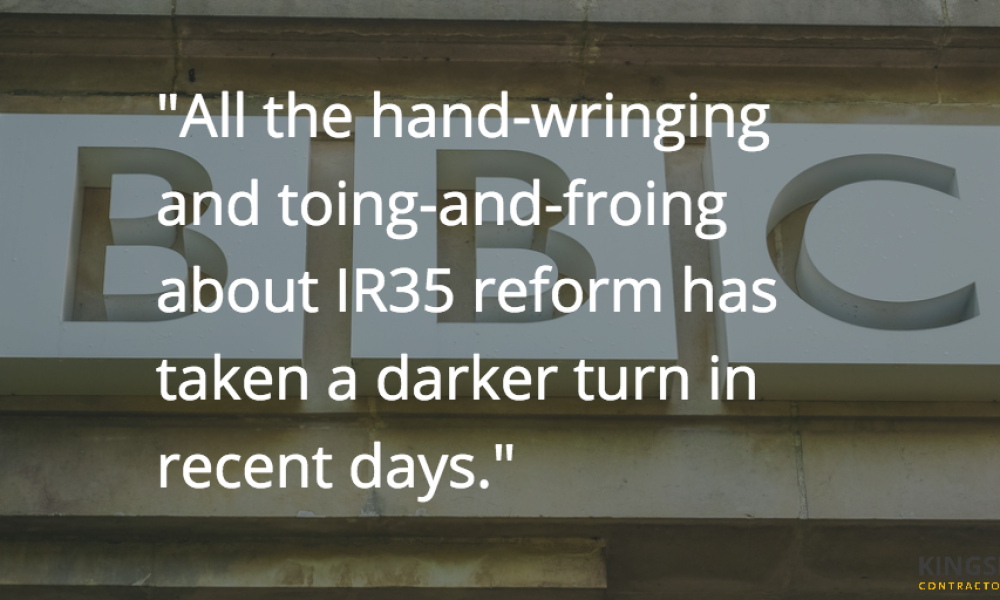HMRC begin IR35 compliance checks
Not even 6 months have passed since the IR35 reforms to the private sector, but it has been reported that…
All the hand-wringing and toing-and-froing about IR35 reform has taken a darker turn in recent days with the revelation that…

All the hand-wringing and toing-and-froing about IR35 reform has taken a darker turn in recent days with the revelation that an unnamed BBC presenter tried to kill herself as a result of stress brought on by pay deal wrangling with the public broadcaster.
In evidence presented to the Digital, Culture, Media and Sport Committee, the anonymous presenter said that she and a number of other colleagues were pressured into setting up personal service companies (PSCs) which subsequently fell foul of HMRC, leading to eye-watering bills for unpaid taxes.
The presenter in question felt forced to set up a PSC in 2011, despite realising that she would lose out financially as a result. As noted by the Guardian: “When controversy over the arrangement blew up in 2017, she said she then had to work on three-month contracts with ‘no sick pay, no holiday, no permanent contract’ opposite a better-paid male staff member who enjoyed those benefits.”
“I have been paid too little due to the use of incorrect tax codes, been subject to clawback, received no information for months on end as to what I was going to live off,” she said. “My mental health deterioration is absolutely linked to the increased stress of working for the BBC. I have always loved working for the BBC but the way they have behaved has reduced me to more than tears.” She said she had recently attempted to kill herself.
Damian Collins, the chair of the House of Commons culture committee, said the accounts of the anonymous individual and others involved were “highly disturbing”. “By allegedly being coerced into these contracts, these individuals may have been denied employment rights and some face liability for huge tax bills,” he said. “This evidence indicates that the BBC is falling well below the standards we would expect in terms of how it treats its staff.”
The BBC announced on Monday that the Centre for Effective Dispute Resolution would conduct an independent process under which presenters would be able to ask for a review of their cases. The process will consider whether it is “appropriate or reasonable” for the BBC to make a contribution towards historic demands for employer’s national insurance.
With DJ Liz Kershaw, radio presenter Kirsty Lang and financial journalist Paul Lewis due to give evidence shortly in front of the committee alarm bells should be ringing in the corridors of power. It’s safe to say that the public-sector rollout of IR35 reform has gone far from smoothly (the BBC inquest being very much a case in point.) The implications for any similar private sector reform need to be considered in detail before any launch.
To recap briefly, since April 2017 contractors in the public sector have had their IR35 status determined by the client – a change which has not worked well. Just last week, on the same day as the Spring Statement, the government took the opportunity to announce that its consultation on extending those changes into the private sector would be released in “the coming months.”
A more cynical observer might suggest that a little underhand stagecraft was employed here – pushing out unpalatable news that was bound to be unpopular under the cover of a more newsworthy event (the Spring Statement in this case.) Unfortunately for the Chancellor, the announcement didn’t go unnoticed.
Despite being trumpeted as a paragon of reliability before its release, the Check for Employment Status for Tax tool (better known as CEST) came in for serious criticism. Given that it cannot be relied upon to make correct determinations, many organisations simply avoid using it and instead take a ‘one-size-fits-all’ approach – a solution that invariably ends up pushing all off-payroll engagements into IR35 unfairly.
As IPSE’s Andrew Chamberlain wrote today, that approach has “resulted in highly skilled, professional contractors fleeing the public sector, robbing it of vital specialist skills, damaging public services and leading to delays in major projects.”
If those changes are extended into the private sector, which seems likely to happen by April 2020 at the latest, one of the key competitive advantages of the UK workforce – its flexibility – will be compromised at a time when it is arguably more needed than ever.
As Chamberlain went on to note, it is time the government stopped treating the self-employed as little more than a nuisance: “There are now 4.8 million self-employed people in the UK, representing 14% of the workforce. This is not a peripheral group, this is a significant pillar of our economy.”
Ultimately, what contractors and freelancers want more than anything is simple – a level playing field and considered regulation. They do not want more or less than regular employees, but just to regarded and treated in the same way. As Richard Coles, himself caught up in the debacle, wrote about his treatment by the BBC recently: “It is a mistake to expect overmuch from an organisation. It is not a mistake, I think, to expect fairness from it.” Contractors, one suspects, feel much the same about our current government.
For more information and updates on IR35 keep tuned in to the Kingsbridge blog, as well as our Knowledge Hub.